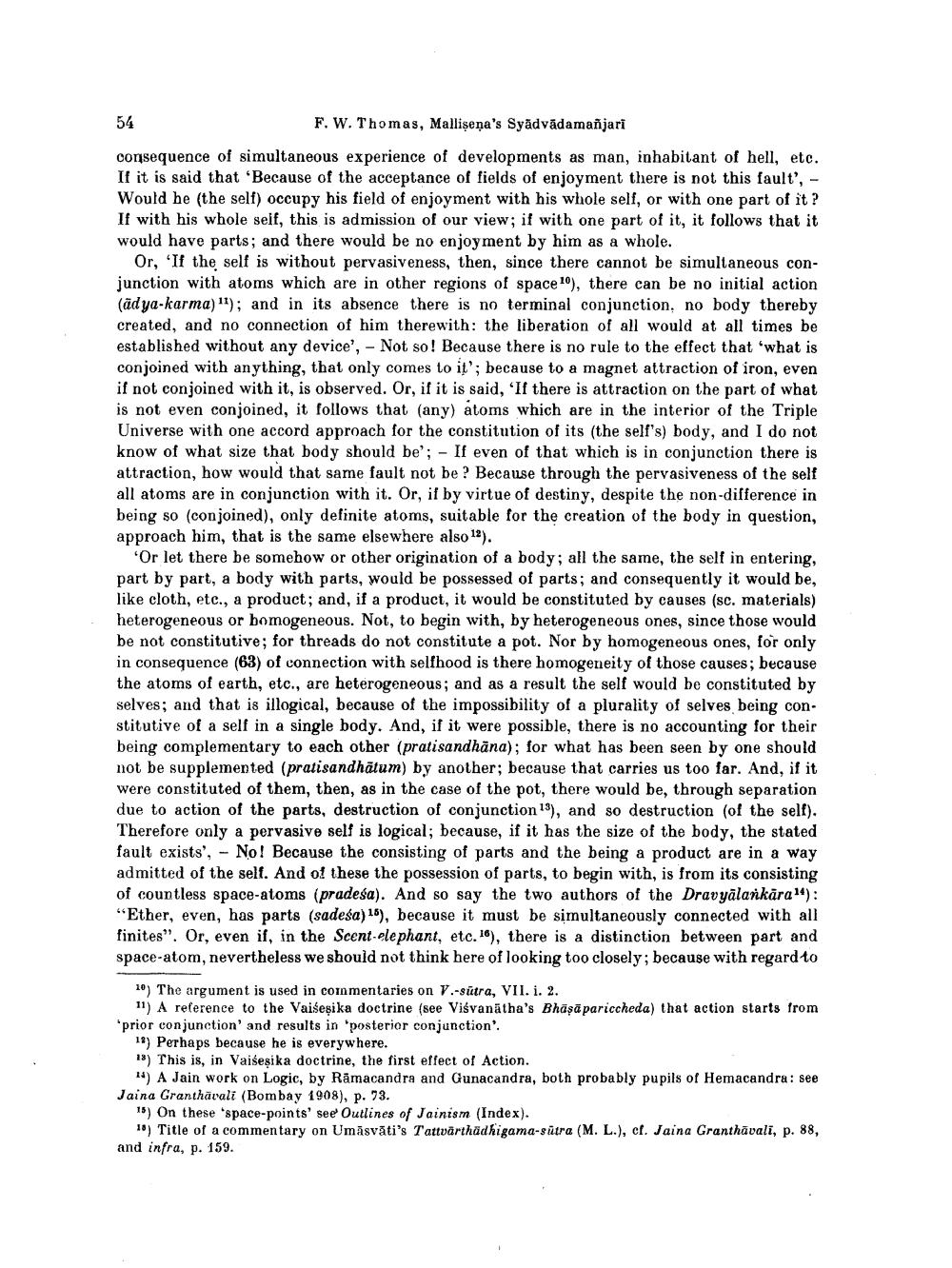________________
54
F. W. Thomas, Mallisena's Syadvadamañjari
consequence of simultaneous experience of developments as man, inhabitant of hell, etc. If it is said that 'Because of the acceptance of fields of enjoyment there is not this fault', - Would be the self) occupy his field of enjoyment with his whole sell, or with one part of it ? If with his whole seif, this is admission of our view; if with one part of it, it follows that it would have parts; and there would be no enjoyment by him as a whole.
Or, 'If the self is without pervasiveness, then, since there cannot be simultaneous conjunction with atoms which are in other regions of space 19), there can be no initial action (adya-karma)"); and in its absence there is no terminal conjunction, no body thereby created, and no connection of him therewith: the liberation of all would at all times be established without any device', - Not so! Because there is no rule to the effect that 'what is conjoined with anything, that only comes to it'; because to a magnet attraction of iron, even if not conjoined with it, is observed. Or, if it is said, 'If there is attraction on the part of what is not even conjoined, it follows that (any) atoms which are in the interior of the Triple Universe with one accord approach for the constitution of its (the self's) body, and I do not know of what size that body should be'; - If even of that which is in conjunction there is attraction, how would that same fault not be ? Because through the pervasiveness of the self all atoms are in conjunction with it. Or, if by virtue of destiny, despite the non-difference in being so (conjoined), only definite atoms, suitable for the creation of the body in question, approach him, that is the same elsewhere also 12).
"Or let there be somehow or other origination of a body; all the same, the self in entering, part by part, a body with parts, would be possessed of parts; and consequently it would be, like cloth, etc., a product; and, if a product, it would be constituted by causes (sc. materials) heterogeneous or bomogeneous. Not, to begin with, by heterogeneous ones, since those would be not constitutive; for threads do not constitute a pot. Nor by homogeneous ones, for only in consequence (63) of connection with selfhood is there homogeneity of those causes; because the atoms of earth, etc., are heterogeneous; and as a result the self would be constituted by selves; and that is illogical, because of the impossibility of a plurality of selves being constitutive of a self in a single body. And, if it were possible, there is no accounting for their being complementary to each other (prati sandhāna); for what has been seen by one should not be supplemented (pratisandhātum) by another; because that carries us too far. And, if it were constituted of them, then, as in the case of the pot, there would be, through separation due to action of the parts, destruction of conjunction 1), and so destruction (of the self). Therefore only a pervasive self is logical, because, if it has the size of the body, the stated fault exists', - No! Because the consisting of parts and the being a product are in a way admitted of the self. And of these the possession of parts, to begin with, is from its consisting of countless space-atoms (pradeśa). And so say the two authors of the Dravyālankara 14): "Ether, even, has parts (sadesa) 15), because it must be simultaneously connected with all finites". Or, even if, in the Scent elephant, etc. 16), there is a distinction between part and space-atom, nevertheless we should not think here of looking too closely; because with regard to
20) The argument is used in commentaries on V.-sutra, VII. i. 2.
11) A reference to the Vaišesika doctrine (see Viśvanātha's Bhäşā pariccheda) that action starts from *prior conjunction and results in posterior conjunction'.
18) Perhaps because he is everywhere. **) This is, in Vaišeşi ka doctrine, the first effect of Action.
1) A Jain work on Logic, by Rāmacandra and Gunacandra, both probably pupils of Hemacandra: see Jaina Granthāvali (Bombay 1908), p. 73.
15) On these *space-points' see Outlines of Jainism (Index).
10) Title of a commentary on Umāsvāti's Tattvarthädhigama-sūtra (M. L.), cf. Jaina Granthāvali, p. 88, and infra, p. 159.




